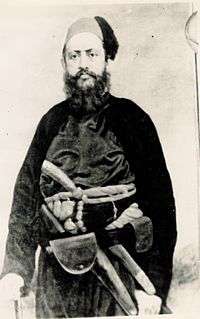Maneckji Limji Hataria
Maneckji Limji Hataria (1813–1890) was an Indian Parsi-Zoroastrian scholar and civil rights activist, who took up the cause of the Zoroastrians of Iran.

Early life
Maneckji was born at the village of Mora Sumali near Surat, in Gujarat, India in 1813;[1] and as he himself tells, earned his own bread from the age of fifteen, traveling widely as a commercial agent in India. By the time of his appointment, he was already experienced, self-reliant and resourceful, and his choice by the Society proved a wholly admirable one. He is remembered among the Zoroastrians of Iran, for whom he was to labor, with only one brief intermission from then until his death in 1890.[2]
Activities in Iran
In 1854 Hataria was appointed emissary by the "Persian Zoroastrian Amelioration Fund", an organization founded in Bombay by Dinshaw Maneckji Petit with the aim of improving the conditions for the less fortunate co-religionists in Iran, who were being persecuted by the Qajar rulers.
In Yazd, Hataria established a Council of Zoroastrians, which succeeded in convincing a number of Iranian Zoroastrians to emigrate to India (where they are today known as Iranis). Hataria may also have been instrumental in obtaining a remission of the jizya poll tax for his co-religionists in 1882.
Manekji preached the advantages of collective social work and communal unity. He urged the Zoroastrians of Yazd and Kerman to form anjuman societies, based somewhat on the pattern of the Bombay Parsi Panchayet. Reports of early activities, sent by Manekji to Bombay, show that amongst other matters, the Kerman society attended to the restoration of the fire temple there. Similarly, hearing of the efforts of Manekji, the Bombay Parsis (led by Sir Dinshaw Petit, whose wife Sakarbai was from her mother's side of Iranian ancestry) collected funds for the repair of the Yazd Atash Behram (not the same as the present one, which dates to 1932). A bust of Manekji stands in the entrance gallery of the present-day Atash Behram at Yazd.
In 1854 Hataria met Bahá'u'lláh, the founder of the Bahá'í Faith, in Baghdad. Although he remained faithful to Zoroastrianism all his life, he became a lifelong admirer of the new religion. Between 1876 and 1882 Mírzá Abu'l-Fadl, a well-known Bahá'í scholar, was Hataria's personal secretary, and acted as his intermediary with Bahá'u'lláh. During this period, at the request of Hataria, Bahá'u'lláh revealed two tablets in pure Persian, which have been included in the collection Tabernacle of Unity.
Association with thinkers and writers of Nasseri era
Maneckji Limji Hataria was the first envoy of Indian Parsis with the history of being interested in Iran and ancient relics of Iran as well as being affected by Neo Zoroastrian or Dasatiri text entered Iran. Despite his first mission was ameliorating the situation of Zoroastrian lives in Iran, but because of the reasons which were mentioned, a little later he was linked to the scholars and writers of Iran in Nasseri era.[3]
References
- K. E. Eduljee, "Parsi Influence Surat", Zoroastrian Heritage.
- "Maneckji Limji Hataria in Iran", English Zoroastrian Library, reprinted from K. R. Cama Oriental Institute Golden Jubilee Volume, Bombay, 1969.
- Hajianpour, H., & Aidi, A. (2017). Maneckji Limji Hataria and His Iranism Interactions with Elites of the Naaser-al-ddinshah Era (1847-1895). Journal of History Culture and Art Research, 6(4), 212-232.
Further reading
- Autobiographical:
- Hataria, Manekji Limji (1865). "A Parsi Mission to Iran". Archived from the original on 26 September 2007. Retrieved 22 August 2006. (An English language translation of Hataria's own report)
- Biographical:
- Boyce, Mary (1969). "Maneckji Limji Hataria in Iran".
- Deboo, Malcolm Minoo (2006). "Seth Maneckji Limji Hataria: The Martin Luther King of Zoroastrianism".
- Maneckji Limji Hataria's Vision for Iranian Zoroastrians
- Hajianpour, H., & Aidi, A. (2017). Maneckji Limji Hataria and His Iranism Interactions with Elites of the Naaser-al-ddinshah Era (1847-1895). Journal of History Culture and Art Research, 6(4), 212-232.
- Soroushian, Mehrborzin (2006). "Manekji Limji Hateria".